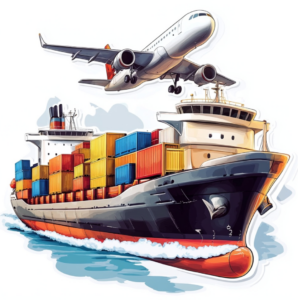This comprehensive guide will help businesses understand the importance of reliable freight forwarding, key factors to consider, and real-world examples that illustrate the benefits of choosing the right partner. By following these guidelines, businesses can align themselves with a freight forwarder that meets their specific operational needs and enhances overall logistics performance.
Why Choosing a Reliable Freight Forwarding Partner Matters
International shipping services involve multiple processes, including customs clearance, transportation management, freight consolidation, warehousing, and real-time tracking. A reliable freight forwarder plays a crucial role in ensuring seamless logistics coordination by managing these complex functions with expertise and efficiency.
Key Benefits of a Reliable Freight Forwarder:
- Smooth Logistics Coordination: A reputable partner ensures efficient freight routing, proper documentation, and compliance with import/export regulations.
- Trusted Supply Chain Management: Reducing the risks of delays, lost shipments, and storage issues enhances overall productivity.
- Efficient Freight Forwarding Operations: A well-connected supply chain partner ensures faster transit times, real-time tracking, and smooth delivery.
- Cost Savings: Preventing mishandling, unforeseen expenses, and storage costs leads to optimized budget allocation.
A poor choice in freight forwarding can result in delays, hidden costs, customs penalties, or even lost shipments. Therefore, it’s essential to conduct thorough research before selecting a freight forwarding partner.
Factors to Consider When Choosing a Reliable Freight Forwarding Partner
1. Reputation and Industry Reliability
The reputation of a freight forwarder can provide insight into their service quality and ability to handle logistics challenges efficiently.
How to Verify Reputation:
- Check Online Reviews and Testimonials: Look for customer feedback on Google, Trustpilot, and industry forums.
- Industry Accreditation and Certifications: Ensure the company has relevant certifications such as IATA (International Air Transport Association), FIATA (International Federation of Freight Forwarders Associations), and NVOCC (Non-Vessel Operating Common Carrier) licenses.
- Case Study – Company A: A U.S.-based e-commerce brand faced shipping delays until they partnered with a certified freight forwarder with proven reliability. Their on-time delivery rate improved by 35%, leading to better customer satisfaction.
2. Experience in International Shipping Services
Experience is one of the most valuable assets in freight forwarding. An experienced company will understand customs regulations, handling various shipment types, and overcoming common international shipping challenges.
Key Areas to Evaluate:
- Years of Industry Experience: Check how long the company has been operating within your industry or shipping routes.
- Familiarity with Global and Regional Markets: Ensure they understand local and international shipping practices.
- Ability to Handle Various Freight Types: From air, sea, and rail freight to LCL (Less-than-Container Load) and FCL (Full-Container Load), experience matters.
Example: Company B, a global electronics distributor, struggled with customs clearance delays in China. After switching to an experienced freight forwarder with expertise in compliance and documentation, the company reduced customs-related shipping delays by 50%.
3. Advanced Technology and Real-Time Tracking
Technology plays a critical role in modern freight forwarding. The right freight forwarding partner should offer technological innovations that facilitate better tracking, documentation, and communication.
Essential Technology Features:
- Real-Time Shipment Tracking: A transparent system that allows businesses to monitor goods in transit.
- Automated Documentation Management: Reducing paperwork errors can streamline operations.
- AI-Powered Predictive Analytics: Forecasting potential delays and optimizing routes for cost-efficiency.
Case Study – Company C: A fashion retailer had difficulty tracking shipments, leading to stock shortages. By switching to a tech-driven freight forwarder, they implemented a GPS tracking system that improved visibility, reducing lost shipments by 40%.
4. Strong Customer Service and Communication
A reliable freight forwarding partner must have excellent customer service and communication. Since international shipping involves multiple time zones and regulations, quick responses and proactive communication are essential.
Key Aspects to Assess:
- Dedicated Support Team: Confirm if they provide 24/7 customer service or regional support assistance.
- Clear Communication Channels: Ensure communication is available via email, chat, and phone.
- Proactiveness in Handling Issues: A proactive partner updates clients on delays, documentation issues, and emergency plan execution.
Final Thoughts: Making the Right Choice for Your Freight Forwarding Needs
Selecting the right freight forwarding partner is a crucial decision that influences your business’s supply chain efficiency, cost-effectiveness, and overall success. By considering key factors such as industry reputation, shipping expertise, technology capabilities, service reliability, and cost transparency, businesses can establish a long-term trusted supply chain management strategy.
Checklist for Choosing a Freight Forwarder:
- ✅ Verify certifications and industry associations.
- ✅ Ensure expertise in handling your industry’s cargo.
- ✅ Confirm real-time tracking and digital solutions are available.
- ✅ Evaluate responsiveness and customer service quality.
- ✅ Check cost transparency and hidden charges.
By taking the time to carefully assess potential partners, businesses can avoid logistical setbacks and enhance operational efficiency while ensuring smooth international shipping services.
Looking for a Reliable Freight Forwarder?
If your business requires a trusted partner for global shipping and supply chain management, conduct thorough research and consider the factors outlined here. A strong freight forwarder relationship can enhance logistics efficiency, ensure compliance, and drive long-term success.




